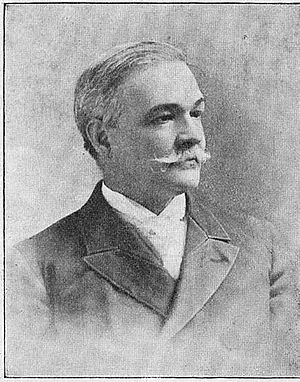Nicanor Bolet Peraza facts for kids
Quick facts for kids
Nicanor Bolet Peraza
|
|
|---|---|
 |
|
| Born | June 4, 1838 Caracas, Venezuela |
| Died | March 24, 1906 (aged 67) New York City, United States |
| Nationality | Venezuelan |
| Notable works | Historia de un guante (1892) |
Nicanor Bolet Peraza (born June 4, 1838 – died March 25, 1906) was an important writer and politician from Venezuela. He was known for his strong opinions and his work in publishing newspapers and magazines. Even when he had to leave his home country, he continued to write and edit, sharing his ideas with many people.
Contents
Early Life and First Steps
Nicanor Bolet Peraza was born in Caracas, Venezuela, in 1838. When he was just one year old, his family moved to Barcelona, Venezuela. There, his father started a printing press. Nicanor and his older brother, Ramon, both worked at the press. This experience made them very interested in publishing.
They even started their own magazine called El Oasis. However, a big conflict called the Federal War began in Venezuela in 1859. Nicanor, who was 21, joined the federal army. He fought in this important war, which was the largest in Venezuela since it gained independence from Spain.
After the federal side won in 1863, Peraza returned to Caracas. He and his brother started a political newspaper called Rotary Museum Illustrated. Around this time, Nicanor married María Perfecta Monagas Marrero. They had four children together.
A Career in Politics
During the war, Nicanor Peraza earned the rank of Brigadier General. This helped him become active in national politics. He was chosen to be a representative in the country's congress. At the same time, he continued his work in publishing, often writing about national opinions.
When Antonio Guzmán Blanco became president in 1870, Peraza first supported him. He hoped for peace and stability in Venezuela. But Peraza soon became unhappy with Guzmán Blanco's strong use of power.
When Guzmán Blanco was removed from power in 1877, Francisco Linares Alcántara became president. Peraza strongly supported Alcántara's new policies. This support earned him a job as secretary in the Ministry of the Interior and Justice. In this role, Peraza worked to help Venezuelans who had been forced to leave the country during the war.
Sadly, Alcántara died unexpectedly in 1878. Antonio Guzmán Blanco then took control of the government again. To challenge Guzmán Blanco's rule, Peraza often published newspapers that criticized the government. Because Guzmán Blanco started targeting people who disagreed with him, Peraza had to leave Venezuela. In 1880, he moved to the United States with his family. He would live there for the rest of his life.
Life in Exile in New York
Being forced to leave Venezuela meant Nicanor Bolet Peraza had to start a new life in New York. He was 42 years old, and he had left behind a successful career in publishing and politics. Despite this, he found new success by continuing his work as an editor and writer.
He became the main editor of two Spanish-language magazines in New York City. From 1885 to 1890, he worked on La Revista Ilustrada de Nueva York (New York Illustrated Magazine). A famous essay called "Nuestra América" (Our America) by José Martí was first published in this magazine. Later, from 1893 to 1896, Peraza started and edited his own magazine called Las Tres Américas (The Three Americas).
Peraza's writing skills and interest in politics guided him in many of his jobs. He even received an offer to be the U.S. Ambassador to Venezuela, which led him to leave La Revista. He also worked with other important Hispanic figures, like his fellow Venezuelan Juan Antonio Pérez Bonalde and the Cuban poet José Martí. Peraza shared many similar ideas with Martí during their time in New York.
In 1888, the president of Venezuela, Juan Pablo Rojas Paúl, recognized Peraza's importance as a Venezuelan writer. He appointed Peraza as a special representative to Washington. After a successful time in Washington, Peraza returned to New York to continue his publishing work.
In 1895, Peraza was invited to celebrate the 100th anniversary of José Gregorio Monagas. Monagas was a past Venezuelan president who fought for freedom and was also Peraza's father-in-law. Peraza accepted the invitation and returned to Venezuela for the celebrations. Although he was excited to see his homeland again, he eventually decided to go back to New York. Peraza died 11 years later, in 1906, at the age of 67.
Selected Works by Nicanor Bolet Peraza
- El Oasis. Barcelona (1856)
- El Museo Venezolano, Barcelona (1865-1866)
- La Opinión Nacional, Caracas (1869)
- La Tribuna Liberal, Caracas (1877)
- La Revista Ilustrada de Nueva York, New York (1885-1890)
- Las Tres Américas, Nueva York (1893-1896)
- Cosmópolis, Caracas (1894)
- Cartas Grendaleses (1900)
- El Valor Civico. A la Juventud Hispano-Americana (1901)
- Impressiones de viaje (1906)
- Artículos de costumbres y literarios. Barcelona, Editorial Araluce (1931)
See also
 In Spanish: Nicanor Bolet Peraza para niños
In Spanish: Nicanor Bolet Peraza para niños
 | Delilah Pierce |
 | Gordon Parks |
 | Augusta Savage |
 | Charles Ethan Porter |

